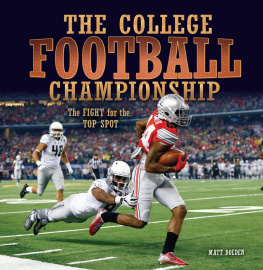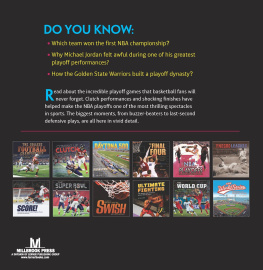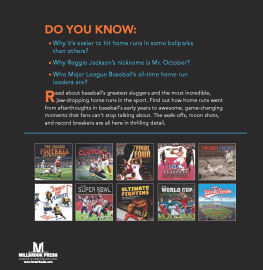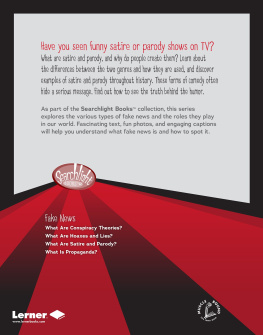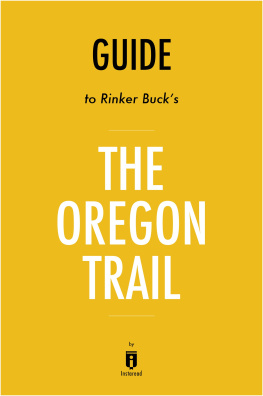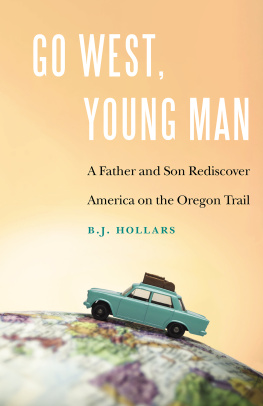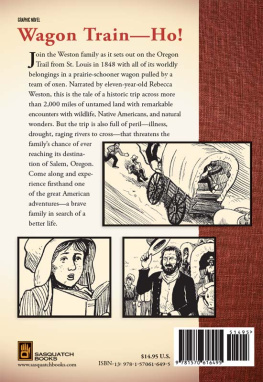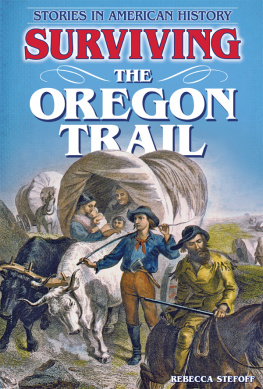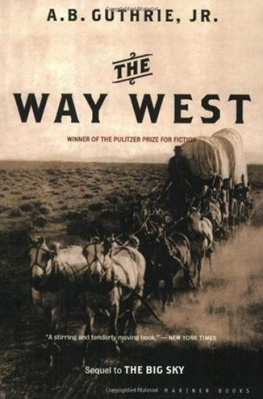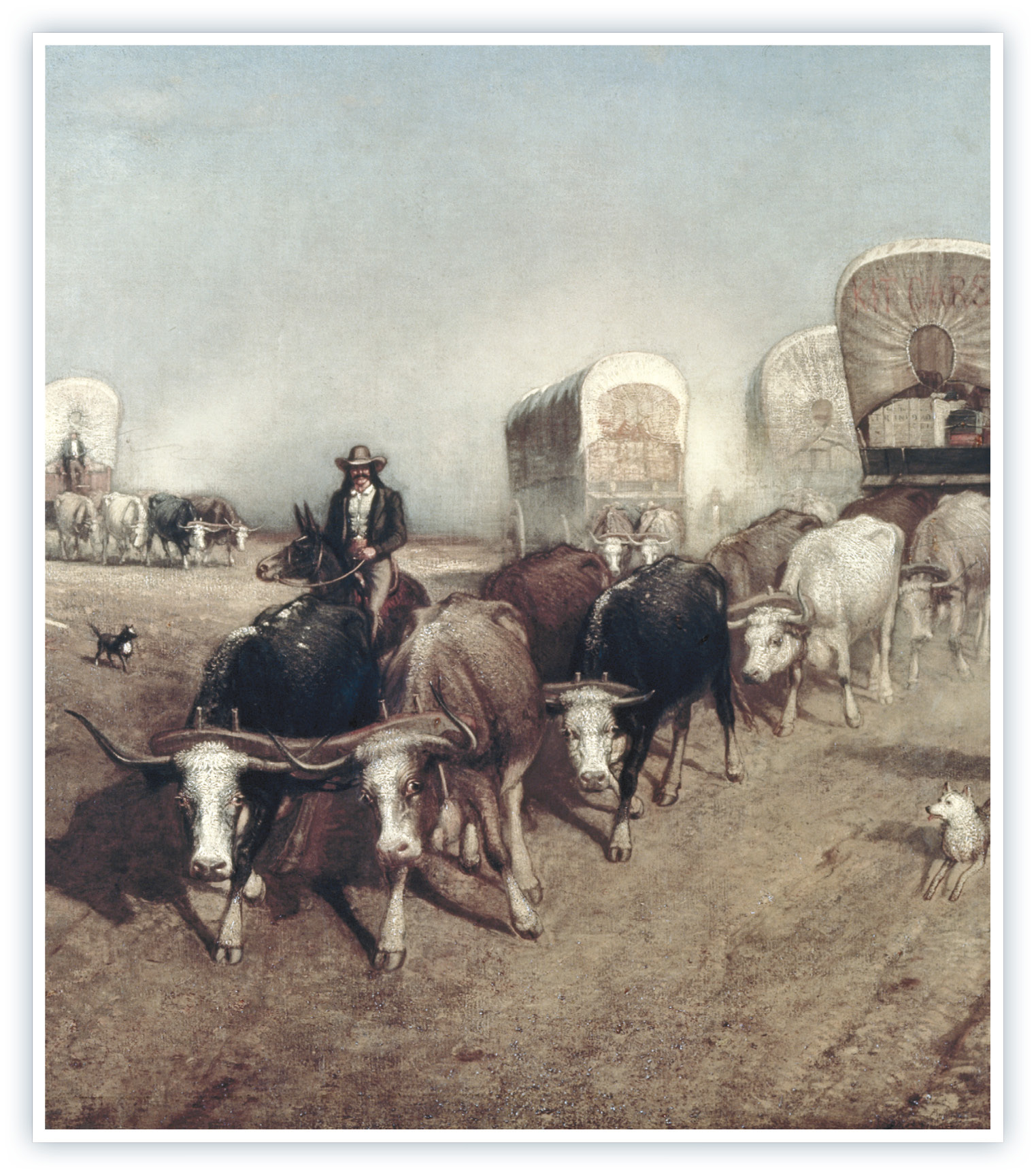TABLE OF CONTENTS
For the best You Choose experience,
view in portrait (vertical) orientation.
ABOUT YOUR ADVENTURE
YOU are living in the United States in the mid-1800sthe time of the Oregon Trail.
In this book youll explore how the choices people made meant the difference between life and death. The events youll experience happened to real people.
Chapter One sets the scene. Then you choose which path to read. Follow the links at the bottom of each page as you read the stories. The decisions you make will change your outcome. After you finish one path, go back and read the others for new perspectives and more adventures. Use your device's back buttons or page navigation to jump back to your last choice.
YOU CHOOSE the path you take through history.
CHAPTER 1
On the Oregon Trail
The mid-1800s were a time of expansion and exploration for the United States. Americans spread out across North America. The promise of a new life called to many. They claimed land for farming and raising livestock.
By the 1840s thousands of people were packing their belongings into wagons and heading west. Most followed the 2,000-mile Oregon Traila trip that took most settlers five or six months to complete. Long wagon trains rumbled across the plains of present-day Kansas, Nebraska, Wyoming, Idaho, and Oregon. Other trails branched off from the Oregon Trail. They led to California, Utah, and other places.
Wagon trains crossed the plains, heading west on the Oregon Trail.
While some people headed west looking for land, others rushed to California to search for gold. On January 24, 1848, James Marshall discovered gold at the sawmill he built for John Sutter on the bank of the South Fork American River near Coloma, California. Stories of the gold brought thousands of people to California who hoped to strike it rich for themselves.
Life was hard on the Oregon Trail. Much of the trail cut through the grasslands of the Great Plains. Settlers were far from civilization. Diseases such as were deadly. Floods, storms, and droughts threatened travelers and their animals. River crossings were dangerous. And while many American Indian groups left the travelers alone, others were less welcoming. Some Indians stole settlers animals. Others attacked or killed the travelers because they felt threatened.
The Louisiana Purchase of 1803 doubled the size of the United States and opened the West for expansion.
The dangers didnt stop the settlers, though. Most left from Independence, Missouri. They followed the trail across the plains. They passed landmarks such as Chimney Rock, Fort Laramie, Fort Bridger, Soda Springs, Fort Boise, and the Snake River along the way. Those who made it to Oregon found fertile land for the taking.
Could you survive the perils of the trail to make a new, better life?
Wagon trains lost many people to the dangers of the Oregon Trail.
CHAPTER 2
Alone on the Plains
It started out as a great adventure. You were traveling west on the Oregon Trail with your parents, twin brother, and little sister. After years of struggling to get by in Missouri, your parents decided your family would start a new life out west.
But the adventure had turned into a nightmare. It started when your father got very sick. Your mother soon followed. It was smallpox. The others in your wagon train couldnt afford to stop. They didnt want to risk catching the disease, and they also needed to reach Oregon before winter.
Life on the Oregon Trail could be especially hard for families with young children.
You decided to stop your wagon on the plains of Nebraska and watched as the train continued west without you. You did all you could to nurse your parents back to health. But your mother died five days ago. Your father followed yesterday. You buried them both along the trail and marked their grave with a cross made of sticks. Now the three of you are alone.
We have to turn around, says 10-year-old Annabelle, her face streaked with tears.
Your brother, Lucas, sits with his head in his hands. Your fathers lies beside him. Theres nowhere for us to go back to, he says with a sigh. We sold everything we own.
But its so far, Annabelle says. How can we do it alone?
You wipe your hands on your apron. Lucas is right, you tell her. Lucas and I are 17. Well be 18 by the time we make it to Oregon. Thats old enough to stake a claim and start a life.
We have to go now, Lucas says. He stands and begins to hitch your mules to the wagon. Were already almost two weeks behind the wagon train. We havent seen another wagon for days. If we dont go now, we wont make it before winter.
Theres another reason to hurry. When you left Missouri, you thought you had enough food and supplies. You have a good team of mules to pull your wagon, as well as your fathers reliable . You have pots, tools, fishing gear, and two good rifles. You left with water casks, flour, bacon, dried beef, sugar, and salt. But over time, your food stores have dwindled. You ate too much early in your journey and lost some food to spoilage. Even if you leave now, youre not sure youll have enough.
Annabelle looks worried. Look, you tell her. We just have to follow the trail, right along the Platte River. Well be to Fort Bridger before you know it.
The trail isnt hard to follow. The prairie grasses are beaten down to bare dirt in places. But that also creates a problem. Your mules need grass to eat. So does the mare. There isnt enough on the trail. Lucas suggests turning to the north in search of better grazing land. But you worry about leaving the main trail.
Shoshone Indians were the dominant tribe along parts of the Oregon Trail.
It takes half the day, but you find the grass that the mules and horse need. You unhitch the team and let them graze. While they eat, you fix a light meal of bread and bacon. Lucas takes the rifle and heads off in search of game.
As your supper cooks, you hear the sound of approaching horses. But its not Lucas. You gasp as you peer around the wagon and see three Indians riding toward you. Every settler on the Oregon Trail has heard frightening stories about Indians. Will they attack? Will they steal your supplies? You wish Lucas were here.




